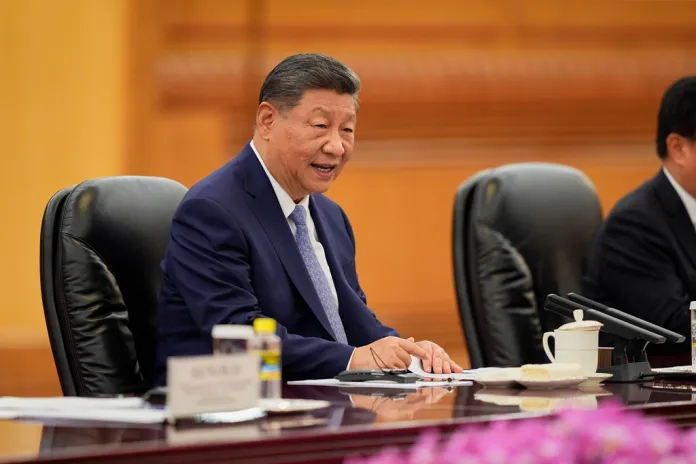Speculation about Chinese President Xi Jinping’s grip on power intensified this week following a military shake up that saw nine Xi loyalists expelled from the party ahead of the Fourth Plenum, a four-day conclave that lays out the country’s economic agenda for the next five years.
The Fourth Plenum, which concludes Thursday, has drawn more than 350 full and alternate members of the Chinese Communist Party‘s central committee. While the details of China’s plan for 2026–2030 aren’t expected to be made public until the National People’s Congress meets in March, that hasn’t stopped Beijing watchers from speculating about what’s to come.

Recent purges of top military and government officials, coupled with China’s sluggish economy, seem to suggest to some that Xi’s power has been challenged. Adding to the speculation were comments President Donald Trump made Tuesday, casting doubt on whether his planned meeting with Xi on the sidelines of the APEC summit in South Korea later this month would actually take place.
“Things are certainly up in the air, and there are all sorts of rumors flying around,” Gatestone Institute senior fellow Gordon Chang told the Washington Examiner. “The assessments cover the spectrum that Xi Jinping will remain in charge, and he might even emerge more powerful than ever to the other end of the spectrum, that he’ll be deposed. So you can take your pick.”
Chang, an expert in Chinese politics, believes there’s enough evidence to make the case that Xi will be “stripped of power,” but added, “we won’t know about it, or we won’t be told about it.”
“I think he’ll emerge from the Fourth Plenum, maybe just a figurehead, but there will be no formal announcements,” Chang said.
Even if Xi were stripped on his roles as Communist Party general secretary and chairman of the Central Military Commission, revealing internal discord and projecting instability at a time when China is seeking to solidify its global power isn’t an option.
“I think that the important point here is that the regime has become more opaque under Xi Jinping, so we know less and less about what’s going on,” Chang said. “We only can see signs of discontent and discord. We know that the signs are there. We don’t know how significant it is, and we just can’t make assumptions. I think the most important thing is we can’t make assumptions about China anymore. We’re just going to learn when we learn.”
Last week, China purged its second-most senior general and eight other high-ranking military commanders as part of a crackdown on corruption and disloyalty.
Gen. He Weidong, a vice chairman of the Communist Party’s top military decision-making body and member of the 24-man Politburo, was dismissed and faces severe disciplinary action for alleged abuses of power, a spokesman for China’s Defense Ministry said Friday.
The CCP also removed eight other senior officers, including the former head of the Central Military Commission’s political-work department, ex-commanders of the country’s strategic missile force and paramilitary police, and former political commissars of China’s army and navy.
The spokesman said investigators had found that the men had committed “severe violations of party discipline” and would face court-martial.
While some experts saw the crackdown as proof of Xi’s power, Chang said it made no sense.
“At a time of political turmoil, why would Xi Jinping get rid of his loyalists?” he asked. “I’m very skeptical of the predominant narrative.”
Other observers have questioned where the ousting leaves Xi, who had promoted the men himself during his rule.
“The key question is this: if Xi Jinping can no longer trust the confidants who came up with him…who can he still trust?” K. Tristan Tang, an analyst at the Washington, D.C.-based Jamestown Foundation, asked. Tang added that seven of the nine generals are among Xi’s oldest military confidants from the Fujian province region in southeastern China.
Xi has led China for 13 years and has shown no sign of wanting to step down. Chang said the public will have to piece together clues to determine whether Xi’s power is being whittled away.
“We’ll only find out about it later, as we see other figures become influential and appear to make decisions,” Chang said.
RARE EARTH STOCKS SOAR AS CHINA TIGHTENS SUPPLY IN TRADE ESCALATION WITH TRUMP
He added that one hint of waning power will be if Xi doesn’t travel outside China.
“That’s an indication of one of two things that either he’s not permitted to travel outside China, or he doesn’t want to travel outside China because he wants to stay close to the action, and he may feel that if he leaves, he might not be permitted back in,” Chang said. “I’d be looking at his travel if he travels to Seoul at the end of the month. That’s an indication that he’s still in charge. If he doesn’t travel to Seoul, it would be an indication that he has lost substantial power.”
